人教版英语七年级下Unit10语法(一般过去时态)课件3
合集下载
人教版七年级下教学课件:Unit 10
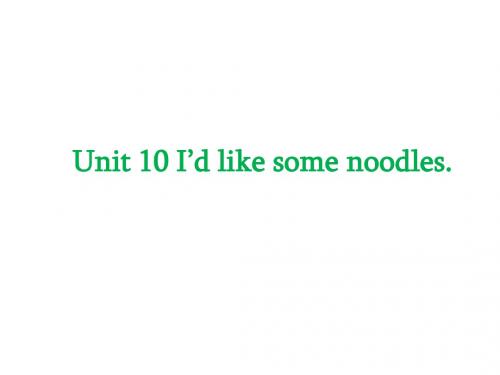
2. If he or she blows out all the candles in one go, the wish will come true. 如果他(她)一口气把 蜡烛全部吹灭的话,许的愿望便会成真。
1)in one go 相当于汉语中的“同一次;一次性 地”,其中的介词还可用at,即at one go。例如: You can’t do the work all at one go. 你不可能一 次把工作都干完。
I’d like a cup of black tea with milk, please. 请给我来杯加奶的红茶。 I want some hot tea, Mom. 妈妈,我想喝些 热茶。 What do you want to eat today, children?孩 子们,今天你们想吃些什么? What would you like to order, sir? 先生,您 想点些什么?
adj. 特别的;特殊的 5. would modal v. (表示意愿)愿意 6. yet adv. (常用于否定句或疑问句)
还;仍然
Hale Waihona Puke 7. large adj. 大号的;大的 8. order n. & v. 点菜;命令 9. size n. 大小;尺码 10. bowl n. 碗 11. meat n. (可食用的)肉 12. dumpling n. 饺子
13. fish n. 鱼;鱼肉 14. pancake n. 烙饼;薄饼 15. world n. 世界 16. answer n. 答案 v. 回答 17. different adj. 不同的 18. cake n. 蛋糕
19. candle n. 蜡烛 20. age n. 年龄 21. blow v. 吹 22. if conj. 如果 23. will v. 将要;会 24. the UK n. 英国
人教版七年级下册语法-PPT精品课件Unit语法一般过去ppt

人教版七年级下册语法示范课件Unit 语法一 般过去 【精品 课件】
人教版七年级下册语法示范课件Unit 语法一 般过去 【精品 课件】
课程引入
内容讲解 课后总结
诊断反馈
一般过去时的时间标志
1. yesterday, the day before yesterday
2. last+ 时间 last week, last month, last year…
人教版七年级下册语法示范课件Unit 语法一 般过去 【精品 课件】
课程引入
内容讲解 课后总结
诊断反馈
Be 动词一般过去时句型变化
句式 肯定句
否定句
一般现在时
一般过去时
T.hey are happy. They were happy last night.
一般疑问句
肯/否回答
特殊疑问句 (红色部分)
人教版七年级下册语法示范课件Unit 语法一 般过去 【精品 课件】
人教版七年级下册语法示范课件Unit 语法一 般过去 【精品 课件】
课程引入
内容讲解 课后总结
诊断反馈
Be 动词一般过去时句型变化
小秘密: 肯定句式:. 主语 + be(was , were) + 其它. 否定句式:主语 + be(was , were) + not + 其它. 一般疑问句:Be(was , were) + 主语 + 其它? 特殊疑问句式: 特殊疑问词+be过去式+主语+其他?
PART 04
Be 动词一般过去时构成
人教版七年级下册语法示范课件Unit 语法一 般过去 【精品 课件】
人教版英语七年级下Unit10 语法(一般过去时态)课件 1

用法
一般过去时
构成
常用时间
用法
表示过去某个时间发生的动作或状态。
My father was at home last night.
表示过去经常或反复发生的动作。
He always went to work by bus last year.
look ——looked
play——played
live——lived stop——stopped study——studied
join WTO , in 2001 China joined WTO in 2001.
get married , in 1999 They got married in 1999.
visit Canada,last Thursday
He visited Canada last Thursday.
hope——hoped trip——tripped worry——worried
写出下列动词的过去式: come---came
see-ook say-- said put-- put sit-sat
buy-----bought give-- gave
常用于一般过去时的时间状语 P7
1.
某个具体的过去时间 in 1987 in June this year yesterday the day before yesterday 2. last引导的表示“上一个”的时间状语 last week last night last year 3. 出现ago, 意思为“…之前”的时间状语 an hour ago, long long ago, ten years ago eg. She left 30 minutes ago.
七年级英语下册-一般过去时课件-人教新目标版

• 7. She took a walk last Sunday evening.
否认句:
• 一般疑问句: • 肯定答复: • 否认答复: • 划线提问:
• 7. She took a walk last Sunday evening.
• 否认句: • She didn’t take a walk last Sunday evening. • 一般疑问句: • Did she take a walk last Sunday evening? • 肯定答复:Yes,she did. • 否认答复:No, she didn’t. • 划线提问: • When did she take a walk ?
2〕 在浊辅音或元音后读[d].
learn ― learned 3〕 在[t] 和[d] 后读[id].
start ― started
巧记动词过去时态
动词一般过去时,表示过去发生的事; be用was或用were, have, has变had; 谓语动词过去式,过去时间作标志; 一般动词加-ed,假设是特殊得硬记。 否认句很简单,主语之后didn’t添; 疑问句也不难,did放在主语前; 如果谓语之前有did,谓语动词需复原; 动词假设是was, were,否认就把not添。
四、一般过去时的分类
1.be 动词的一般过去时态:有人称和数的变化 〔am/is 的过去式为was; are的过去式为were.〕
肯定句:主语+was (were) +…
I was late yesterday.
否认句:主语+was (were) +not+…
We weren't late yesterday. 疑问句:Was (Were) +主语+…+?
新目标人教版七级下册一般过去时PPT课件

.
14
give→gave 4、“骑(马)”“开(车)”“写(字)”——把 i变o 如:ride→rode,drive→drove,write→wrote
.
12
5、“想”“买”“带来”“打仗”——ought换上,如: think→thought,buy→bought,bring→brought, fight→fought
.
13
一般过去时口诀 一般过去时并不难,过去动、状记心间。 动词要用过去式,时间状语句末站。 否定句很简单,didn’t 站在原形前, 其它部分不用变。 一般疑问更好变,did提到句子前, 主、动原形、加其它,几个部分依次站。 特殊疑问也简单, 疑问词来排头看,一般疑问后面接。 最后一条请注意,过去形式要牢记。
.
10
试一试
柏胜游泳( ) 之前先跑( )了几圈, 跑完后感觉很累,就坐( )在沙滩上休息 一下,这时候尼加提来( )了,递给 ( )他一些吃的( )和喝的( ), 之后两个人就变的( )很开心,开始 ( )唱起歌来了( )。
.
11
动词过去式的特殊变化
1、中间去e末尾加t,如: keep→kept,feel→felt,sleep→slept,weep→swept 2、结尾d变t,如: build→built,lend→lent,send→sent,end→spent 3、遇见i改为a,如: ring→rang,sit→sat,drink→drank, sing→sang, swim→swam,begin→began,
last night / year / week,
two years ago
.
2
结构1
1. 表示过去的状态: 主语+was/were+ 其它
人教版英语七年级下一般过去时PPT教学课件
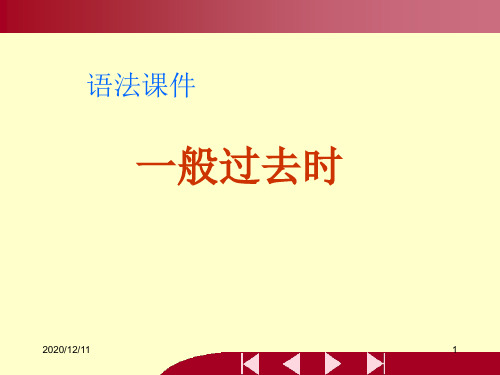
语法课件
一般过去时
2020/12/11
1
一般过去时
2020/12/11
知识结构
用法
表示过去某个时 间或某一段时间 内发生的动作或 存在的状态。
常用时间 构成
yesterday last night
in 1990 two days ago
动词过去式
2
动词过去式 的构成
规则动词 不规则动词
构成 读音
passed cooked 2、元浊 /d/ ,即 ed 在元音,浊辅音后面念 /d/ ,
例: borrowed enjoyed
called moved 3、/t/ /d/ 之后念 /id/ , 即 ed 在 /t/ /d/ 音后面念 /id/
例: wanted shouted
2020/12/11
needed counted
Past tense caught came did drew drank drove ate put
6
一般过去时态句式的构成
陈述句式
2020/12/11
进入下页 返回7首页
一般过去时态句式的构成
疑问句式2020/12/11 Nhomakorabea8
返回上页 返回首页
巧记动词过去时态
动词一般过去时,表示过去发生事; be用was或用were, have,has变had; 谓语动词过去式,过去时间坐标志; 一般动词加-ed,若是特殊得硬记。 否定句很简单,主语之后didn’t添; 疑问句也不难,did放在主语前; 如果谓语前有did,谓语动词需还原; 动词若是was,were,否定就把not添。
2020/12/11
返回上页 返回首页9
一般过去时态练习
一般过去时
2020/12/11
1
一般过去时
2020/12/11
知识结构
用法
表示过去某个时 间或某一段时间 内发生的动作或 存在的状态。
常用时间 构成
yesterday last night
in 1990 two days ago
动词过去式
2
动词过去式 的构成
规则动词 不规则动词
构成 读音
passed cooked 2、元浊 /d/ ,即 ed 在元音,浊辅音后面念 /d/ ,
例: borrowed enjoyed
called moved 3、/t/ /d/ 之后念 /id/ , 即 ed 在 /t/ /d/ 音后面念 /id/
例: wanted shouted
2020/12/11
needed counted
Past tense caught came did drew drank drove ate put
6
一般过去时态句式的构成
陈述句式
2020/12/11
进入下页 返回7首页
一般过去时态句式的构成
疑问句式2020/12/11 Nhomakorabea8
返回上页 返回首页
巧记动词过去时态
动词一般过去时,表示过去发生事; be用was或用were, have,has变had; 谓语动词过去式,过去时间坐标志; 一般动词加-ed,若是特殊得硬记。 否定句很简单,主语之后didn’t添; 疑问句也不难,did放在主语前; 如果谓语前有did,谓语动词需还原; 动词若是was,were,否定就把not添。
2020/12/11
返回上页 返回首页9
一般过去时态练习
人教版七年级英语下册Unit 10 第十单元教学课件PPT
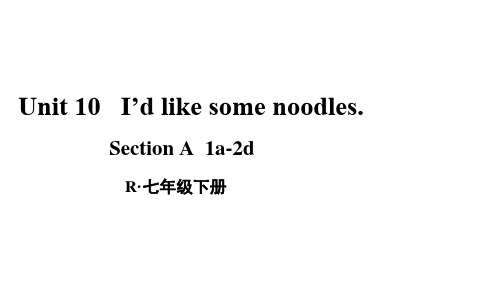
Байду номын сангаас
1b Listen and check (√) the noodles that the
person orders.
____ Special 1 ____ Special 2 ____ Special 3
What would
I’m not sure yet. Are
youa辨nli析yk形ea?n容y词与,so意m为e “一些”
What kind of noodles would you like? I ’d like ___m_u_t_t_o_n_a_n__d_p_o_t_a_t_o_ noodles.
What size would you like? I ’d like _m_e_d_i_u_m__ bowl.
Let’s read & answer the questions
Waitress: Sure. What sizesiwzeo大u小ld;y尺ou码l;ikweh?at size常用
来询问物体的尺寸、大小。
Sally: Large, please.
with作介词,意为“同;跟;和……一起”
Tom: We’d also like gongbao chicken and some mapo tofu with rice.
Waitress: Yes, _t_h_e_r_e_a_r_e_ some tomatoes. Boy: OK, I’d like the _b_e_e_f_n_o_o_d_l_e_s , please.
1c Practice the conversation in 1a with your
partner. Then make your own conversations.
1b Listen and check (√) the noodles that the
person orders.
____ Special 1 ____ Special 2 ____ Special 3
What would
I’m not sure yet. Are
youa辨nli析yk形ea?n容y词与,so意m为e “一些”
What kind of noodles would you like? I ’d like ___m_u_t_t_o_n_a_n__d_p_o_t_a_t_o_ noodles.
What size would you like? I ’d like _m_e_d_i_u_m__ bowl.
Let’s read & answer the questions
Waitress: Sure. What sizesiwzeo大u小ld;y尺ou码l;ikweh?at size常用
来询问物体的尺寸、大小。
Sally: Large, please.
with作介词,意为“同;跟;和……一起”
Tom: We’d also like gongbao chicken and some mapo tofu with rice.
Waitress: Yes, _t_h_e_r_e_a_r_e_ some tomatoes. Boy: OK, I’d like the _b_e_e_f_n_o_o_d_l_e_s , please.
1c Practice the conversation in 1a with your
partner. Then make your own conversations.
人教版七年级英语下册Unit10SectionAGrammarFocus-3c课件

Would you like a large bowl?
Yes,please.
Is there any meat in the tomato and No,there isn't there's no meat.
Countable nouns
Uncountable nouns
tomato... f .
4 . Yes , th er e ar e s o me
carrots. c .
5. Sure. What size would you
like? e .
6. We have large, medium and
small bowls. b .
. a.What kind of noodles do you have?
3c
Work in small groups. Who would like the food below? Write their names on the cards above the food.
A:Anna,what would you like to eat?
B: I'd like beef noodles with carrots.
the supermarket. 5. There ____i_s___ (be) some milk and eggs in the fridge(冰
箱).
二、单项选择。
1.—Is there ____ mutton in the fridge,Tonny?
B
—No,there's no mutton.There is ______ beef.
⑤单个单数名词作主语时, 谓语动词要用单数形 式, 多个单数名词或复数名词作主语时, 谓语动 词要用复数形式。 eg:Jim comes from England.杰姆来自英国。 Lily and Lucy are twins.丽丽和露西是双胞胎。 ►不可数名词的用法: ①只有一种形式。 eg:bread;juice;milk;water;tea;meat ②不能用不定冠词或数词直接修饰,可用“量 词+of”这种形式来表示数量的多少,量词有复 数形式。 eg:two cups of tea;three bowls of rice
人教版七年级下语法教学:一般过去时(Present SimpleTense)课件(共23张ppt)
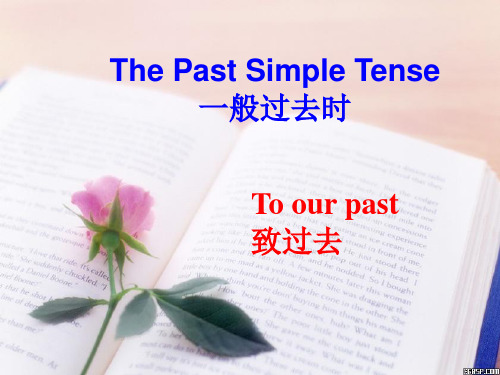
She taught me many things when I was little. She helped me with schoolwork when I began my schoolwork. She looked after me so well that I could grow up well. She did quite a lot of these things Just because she loved me.
• We went out together, we saw sea together, • We shared food with each other, • we talked with each other, • That was excellent.
I love old days and miss _______ most.
What did you do on Mother’s Day?
do-dห้องสมุดไป่ตู้d
I bought some flowers.
buy-bought
I made a lovely card.
make-made
I w__a_s_h_e_d the dishes.
wash-washed
I _s_a_id__“I love you” to her.
The Past Simple Tense 一般过去时
To our past 致过去
Yesterday Once More 昨日重现
• When I was young, • I’d listen to a radio; • Waiting for my
favorite song, • When they played • I’d sing along; • It made me smile, •…
Unit10《Wheredidyougoonvacation》课件3(30张PPT)(人教版新课标七年级下)
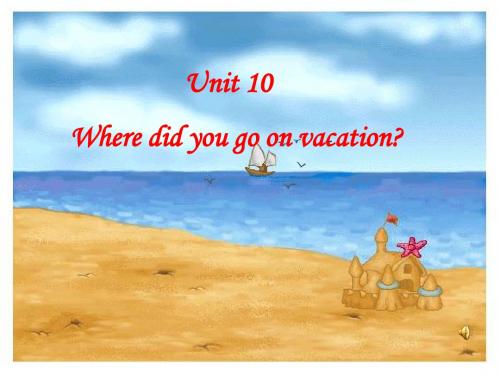
Paire an American student on vacation in Beijing.Write a travel diary.
Thursday, August 1st Today I went to the Palace Museum. It was cool.Then I_____________
______________ awful ______________ expensive ______________ ______________ crowded
Listen to Vera talking about her vacation. Answer these questions.
A: Did they go to…?
B: Yes, they did.
No, they didn’t.
A: Did she /he go to…? B: Yes, she /He did.
No, she /He didn’t.
the Palace Museum (V) Beijing Hutong (V)
the Summer Palace (X)
Bob’s travel diary.
good things: the weather great the beach beautiful playing in the water fun helping the littleboy find his father playing tennis really fun eating Sichuan food delicious
Unit 10 Where did you go on vacation?
What did these people think of their vacations ?
人教七年级下册Unit一般过去详讲PPT

否定句:
Tom and Jerry didn’t love fighting with each other in the past.
一般疑问句: Did Tom and Jerry love fighting with each other in the past?
划线部分提问: What did Tom and Jerry love in the past?
一般过去时
目录
CONTENT
知识点
训练
作业
Part 1
知识点
Yesterday Once More
When I was young I'd listen to the radio
Waiting for my favorite songs
When they played I'd sing along It made me smile
5.I ____c_a_l_le_d___ (call) Mike this morning. st week we __p_i_c_k_e_d__ (pick) many apples on the farm. 7.My mother ____d_i_d_n_'_t_d__o____ (not do) housework yesterday. 8.She often watches TV. But she _d_i_d_n_'_t_w__a_t_c_h_ (not watch) TV last night. 9.__D__i_d___ your father ___g_o____ ( go ) to work every day last year? 10. —What time __d_i_d___ you __g_e_t___ (get) to Beijing yesterday? —We ____g_o_t____ (get) to Beijing at 9:00 in the evening.
七年级英语下册第十单元课件 人教版.ppt
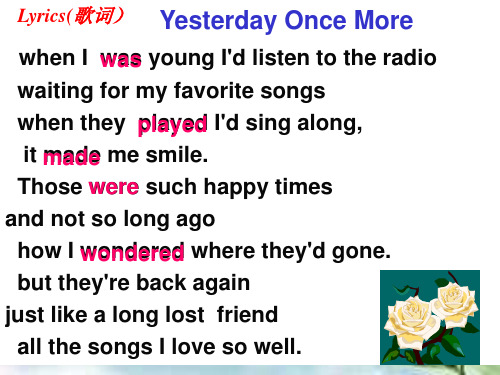
1b. Listen and answer: Where did they go on vacation?
Name
Activities
1. Tina
went to the mountains
2. Xiang Hua visited his uncle
3. Sally
stayed at home
4. Brad
cation Survey
Name Place
Activity
Miss Shen Shanghai visited friends
Sentences you need:
Where did you go on vocation? What did you do?
Homework:
1. Review and recite the key phrases and the dialogue.
2. Preview the new lesson.
Exercises
Match the sentences. Draw a line.
1. He went to summer
a. at home .
Lyrics(歌词) Yesterday Once More
when I was young I'd listen to the radio waiting for my favorite songs when they played I'd sing along, it made me smile. Those were such happy times and not so long ago how I wondered where they'd gone. but they're back again just like a long lost friend all the songs I love so well.
人教版新目标英语七年级下册 第十单元第三课时 教学课件

Homework
1.Remember the new words and expressions in this period. 2.Ask Ss to try to retell the passage in 2b after class.
Because they bring good luck to the birthday person.
Ⅰ.根据句意及首字母提示补全单词
1.How many countries are there in the w orld ?
2.I can’t a nswer all of the teacher’s questions.
Country
Food
Special meaning
UK
Blowing out candles on a cake
birthday makes a wish come true. It is
cake
lucky to find a candy in a ca eggs
1.___b_ meat 2. __g__ dumplings
3. __a__ porridge 4. __h__ green tea
5. ___c_ orange juice 6. __e__ soup 7. __i__ onions 8. __d__ fish
9. __f__ pancakes
Circle the things you like in 1a. Put an “X” next to the things you don’t like. Then tell your partner what you like and don’t like.
3.Birthday foods are not the same in
人教七下语法一般现在时和一般过去时(共23张PPT)
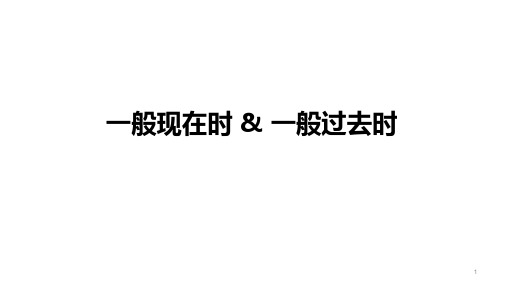
Practice
The next morning before class, he called Tom 5 his desk and 6 to him, “You got all your homework right this time. Did your father help you?” Sometimes Tom’s father helped him with his homework, 7 this time he didn’t help Tom because he 8 at home. So Tom answered, “No, Sir. He was busy last night, so I 9 to do it 10 .”
动词原形 sit
swim draw sing can sleep meet read
过去式 sat
swam drew sang could slept met read
Language points
动词原形 teach say begin give drink let spend
过去式 taught
Practice
改错题
1. How is Jane yesterday? 2. He go to school by bus every day. 3. He often goes home at 6:00 last month. 4. She can flys kites now. 5. Did you saw him just now. 6. She stayes at home last weekend.
Language points
写出下列动词的过去式 smile drop shop carry cry stay
- 1、下载文档前请自行甄别文档内容的完整性,平台不提供额外的编辑、内容补充、找答案等附加服务。
- 2、"仅部分预览"的文档,不可在线预览部分如存在完整性等问题,可反馈申请退款(可完整预览的文档不适用该条件!)。
- 3、如文档侵犯您的权益,请联系客服反馈,我们会尽快为您处理(人工客服工作时间:9:00-18:30)。
他两年前是个小学生吗? Was he a pupil two years ago?
昨天你的手表工作正常吗? Did your watch work well yesterday?
(4).特殊疑问句由“特殊疑问词+一般疑问句”构成.例如
他两年前是干什么的? What was he two years ago. 他什么时候是小学生? When was he he a pupil? 你手表昨天走得怎么样? How did your watch work yesterday
(3).表示过去的习惯.例如
我以前经常坐公共汽车上学,但是现在我坐父亲的车上学.
I often went to school by bus,but now I go in my father’s car.
2.一般过去时态的肯定句、否定句、和疑问句
(1).肯定句由“主语+动词的过去式”构成.例如:
他两年前是个小学生. He was a pupil two years ago. 昨天我的手表工作很正常.My watch worked well yesterday.
(2).否定句由“主语+be(was/were)+not…”或“主语+didn’t+动词原形 构成。例如:
他两年前不是个小学生。 He wasn’t a pupil two years ago. 昨天我的手表坏了。 My watch didn’t work yesterday.
(3).一般疑问句:提前be或者加助动词did.例如:
A.does;get B.did;get C.did;to get D.does;to get
5.Miss Liu came here____D_____.
A.since a month ago B.next month C.for a month D.a month ago
6.I __D____to the farm because I was ill.
(2).虽然句子中没表明特定的时间,但是通常这个动作是发生在过去的.例如:
你在聚会上玩得开心吗?
Did you enjoy the party?
你去哪了?
Where did you go?
我上个假期想去看我奶奶,但是没去. I wanted to see my grandma last vacation, but I didn’t go.
1.My parents___D___late yesterday.
A.get to home B.get home C.got to home D.got home
st Sunday,I went to the shopping mall with my mother,__D___a coat and
----John___C___.
A.cleaned B.does C.did
D.is
9.The manager____C____that the business would be worse after the stock
went down.
A.talked B.told
C.said
D.spoke
______lunch at KFC
A.buy;have B.buy;to have C.to buy;to have D.bought;had
3.I __A_____countryside two years ago.
A.lived in
B.lived C.live in D.live
4.What time_____B__his mother_______up yesterday?
A.not go B.not went C.didn’t went D.didn’t go
7.This kind of apple___B___delicious.I want one more.
A.smells B.tastes C.looks D.seems
8.----Who cleaned the blackboard yesterday,Dick?
一般过去时态
1.一般过去时态的用法:
(1).表示在过去某一特定时间发生或结束的动作.例如:
我昨天遇到她了.
I met her yesterday.
我是1991年出生的. She was born in 1991.
上次学校旅行时我买了个纪念品. I bought a souvenir on my last school trip.
Mary __d_i_d_n_’t_ ___g_o____ to school last week because she__w_a_s_ ill.
3.你什么时候与朋友一起去看的这部电影? When__d_i_d__you __g_o_ to _w__a_tc_h_ __th_e___m__o_vi_e_with your friends.
10.there___B___a lot of people at the street corner when ed.
A.was
B.were
C.have been D.had
根据所给汉语完成句子 1.你在上次学校旅游的时候照相了吗?
Did you___ta_k_e___ __a_n_y____ _p_h_o_to_s__ on your last trip? 2.玛丽上周没有去上学,因为她生病了
Buy win watch meet have
1.Maria____w_o_n_____first prize in yesterday’s singing competition. 2.we___m__e_t __a famous basketball player. 3.I ____h_a_d__a bowl of noodles for lunch.It was terrible. 4.I helped Sally___b_u_y____a new watch. 5.We___w_a_t_c_h_e_d_a movie about living in the future.
昨天你的手表工作正常吗? Did your watch work well yesterday?
(4).特殊疑问句由“特殊疑问词+一般疑问句”构成.例如
他两年前是干什么的? What was he two years ago. 他什么时候是小学生? When was he he a pupil? 你手表昨天走得怎么样? How did your watch work yesterday
(3).表示过去的习惯.例如
我以前经常坐公共汽车上学,但是现在我坐父亲的车上学.
I often went to school by bus,but now I go in my father’s car.
2.一般过去时态的肯定句、否定句、和疑问句
(1).肯定句由“主语+动词的过去式”构成.例如:
他两年前是个小学生. He was a pupil two years ago. 昨天我的手表工作很正常.My watch worked well yesterday.
(2).否定句由“主语+be(was/were)+not…”或“主语+didn’t+动词原形 构成。例如:
他两年前不是个小学生。 He wasn’t a pupil two years ago. 昨天我的手表坏了。 My watch didn’t work yesterday.
(3).一般疑问句:提前be或者加助动词did.例如:
A.does;get B.did;get C.did;to get D.does;to get
5.Miss Liu came here____D_____.
A.since a month ago B.next month C.for a month D.a month ago
6.I __D____to the farm because I was ill.
(2).虽然句子中没表明特定的时间,但是通常这个动作是发生在过去的.例如:
你在聚会上玩得开心吗?
Did you enjoy the party?
你去哪了?
Where did you go?
我上个假期想去看我奶奶,但是没去. I wanted to see my grandma last vacation, but I didn’t go.
1.My parents___D___late yesterday.
A.get to home B.get home C.got to home D.got home
st Sunday,I went to the shopping mall with my mother,__D___a coat and
----John___C___.
A.cleaned B.does C.did
D.is
9.The manager____C____that the business would be worse after the stock
went down.
A.talked B.told
C.said
D.spoke
______lunch at KFC
A.buy;have B.buy;to have C.to buy;to have D.bought;had
3.I __A_____countryside two years ago.
A.lived in
B.lived C.live in D.live
4.What time_____B__his mother_______up yesterday?
A.not go B.not went C.didn’t went D.didn’t go
7.This kind of apple___B___delicious.I want one more.
A.smells B.tastes C.looks D.seems
8.----Who cleaned the blackboard yesterday,Dick?
一般过去时态
1.一般过去时态的用法:
(1).表示在过去某一特定时间发生或结束的动作.例如:
我昨天遇到她了.
I met her yesterday.
我是1991年出生的. She was born in 1991.
上次学校旅行时我买了个纪念品. I bought a souvenir on my last school trip.
Mary __d_i_d_n_’t_ ___g_o____ to school last week because she__w_a_s_ ill.
3.你什么时候与朋友一起去看的这部电影? When__d_i_d__you __g_o_ to _w__a_tc_h_ __th_e___m__o_vi_e_with your friends.
10.there___B___a lot of people at the street corner when ed.
A.was
B.were
C.have been D.had
根据所给汉语完成句子 1.你在上次学校旅游的时候照相了吗?
Did you___ta_k_e___ __a_n_y____ _p_h_o_to_s__ on your last trip? 2.玛丽上周没有去上学,因为她生病了
Buy win watch meet have
1.Maria____w_o_n_____first prize in yesterday’s singing competition. 2.we___m__e_t __a famous basketball player. 3.I ____h_a_d__a bowl of noodles for lunch.It was terrible. 4.I helped Sally___b_u_y____a new watch. 5.We___w_a_t_c_h_e_d_a movie about living in the future.
